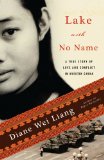Summary | Excerpt | Reviews | Beyond the Book | Readalikes | Genres & Themes | Author Bio

 Book Reviewed by:
Book Reviewed by:
Marnie Colton
Buy This Book
Ten years later, Xiao Li traveled to Beijing and visited us. I waited with great anticipation for his arrival. I still remembered the handsome young man with soft white skin. Once again my thoughts went back to the mountains of red azaleas and white-water rivers. When he finally came, I could not believe my eyes. His face was dark and rough. Although he was about fifteen years younger, he looked my father's age.
Xiao Li told my father how thankful he still was for my family's kindness. He took out beautiful handmade insoles in typical Miao patterns, traditional Miao gifts to make your shoes more comfortable.
"My wife made these herself. One for big sister," he turned to my mother, who was bringing in tea, "and one for you, Old Liang.
"These are for the children. I hope they fit, because she sized them by guessing."
He took the tea. We were all sitting around the table, looking at him. We each had different thoughts going through our minds, thoughts that stretched back ten long years. I searched my memory for the young man who often came to our apartment for meals, and to whom I loved to show off my reading skills.
"Good tea." He nodded at my father gratefully. He told us that he wanted to move his family back to Shanghai so that his son would be able to go to a decent school and thus have a future.
"I talked to so many people, in Nanchuan, Chengdu (the capital of Sichuan province) and Shanghai, but no one wanted to help. They said that I had given up my Shanghai Hukou and there is nothing they can do now." He sipped more tea and continued. "They said that my son was born in Nanchuan and our family Hukou was there, so it was in Nanchuan that we need to stay for the rest of our lives. But if we stay, my son will have no future; with the kind of schooling there, he would not even have a chance to go to high school."
After Xiao Li had left and the tea was cold, my parents talked at length about the labor camp years, the young man and the fate of others we'd known.
"He should never have given up his Shanghai Hukou," said my mother as soon as Xiao Li left. "It's worth its weight in gold." Then she turned to my father who was putting away the teapot and cups. "Remember how difficult it was for me to try to move to Shanghai? And I was a highly qualified university graduate! Twelve years we had to live apart."
"In the end, I had to exchange my Shanghai Hukou with someone in Beijing before I could move here," echoed my father. "A Shanghai Hukou is worth more than the weight of it in gold."
"But it was not his fault," Baba continued, now angrily. "No one knew where events would turn next. First, it was the 'Great Leap Forward': everyone sent out to make steel. Then it was 'Let A Thousand Flowers Bloom,' when you were supposed to criticize the shortcomings of the Party."
"Had you done so, you would have been put in prison in the 'Anti-Rightist Movement,'" said Mama.
"Then there was 'Up the Mountains and Down to the Countryside,'" I added, remembering the older brothers and sisters of my friends, many of whom had gone to work in remote People's Collective Communes in the Cultural Revolution.
"One moment you were red, another moment you were black. One year we were sent to the labor camp, three years later we came back. It was revolution -- reorganizing the whole society," said Baba. "Like all of us, Xiao Li just wanted to live a life. He did the best he could."
Red was the good communist color. Black was bad, shorthand for capitalists. In the Cultural Revolution, people were categorized into either red or black depending on their birth. Reds included peasants, workers, revolutionary officers and their children. There were nine black categories that included landlords, capitalists, "stinky intellectuals" and their descendants. Another of the black categories was "spy," which, broadly speaking, included anyone with overseas connections. People in the black categories became the targets of the Cultural Revolution. Many were stripped of their jobs and positions, sent to labor camps, imprisoned or even killed.
Copyright © 2003 by Wei Liang





The Flower Sisters
by Michelle Collins Anderson
From the new Fannie Flagg of the Ozarks, a richly-woven story of family, forgiveness, and reinvention.

The House on Biscayne Bay
by Chanel Cleeton
As death stalks a gothic mansion in Miami, the lives of two women intertwine as the past and present collide.

The Funeral Cryer by Wenyan Lu
Debut novelist Wenyan Lu brings us this witty yet profound story about one woman's midlife reawakening in contemporary rural China.
Your guide toexceptional books
BookBrowse seeks out and recommends the best in contemporary fiction and nonfiction—books that not only engage and entertain but also deepen our understanding of ourselves and the world around us.